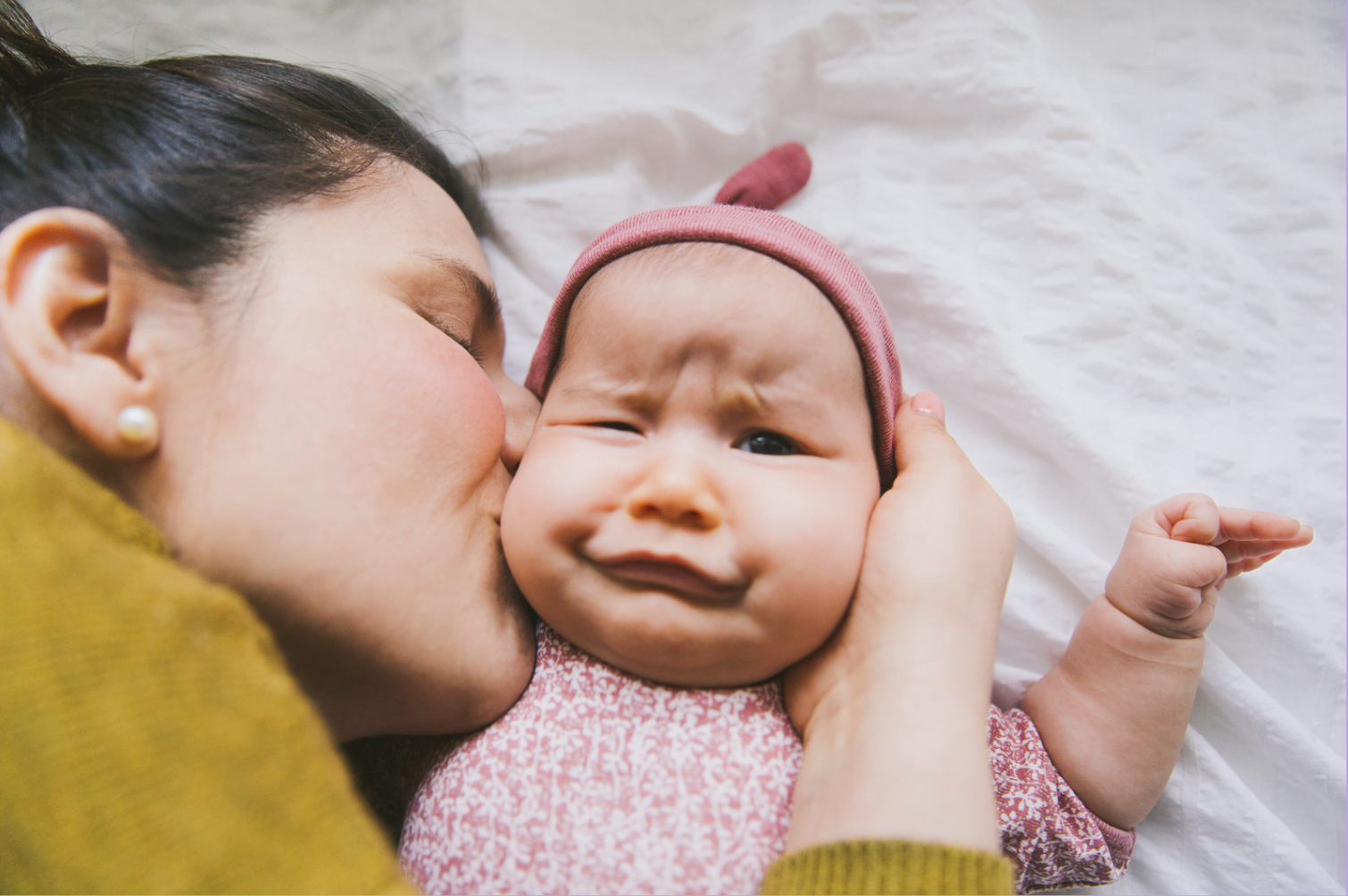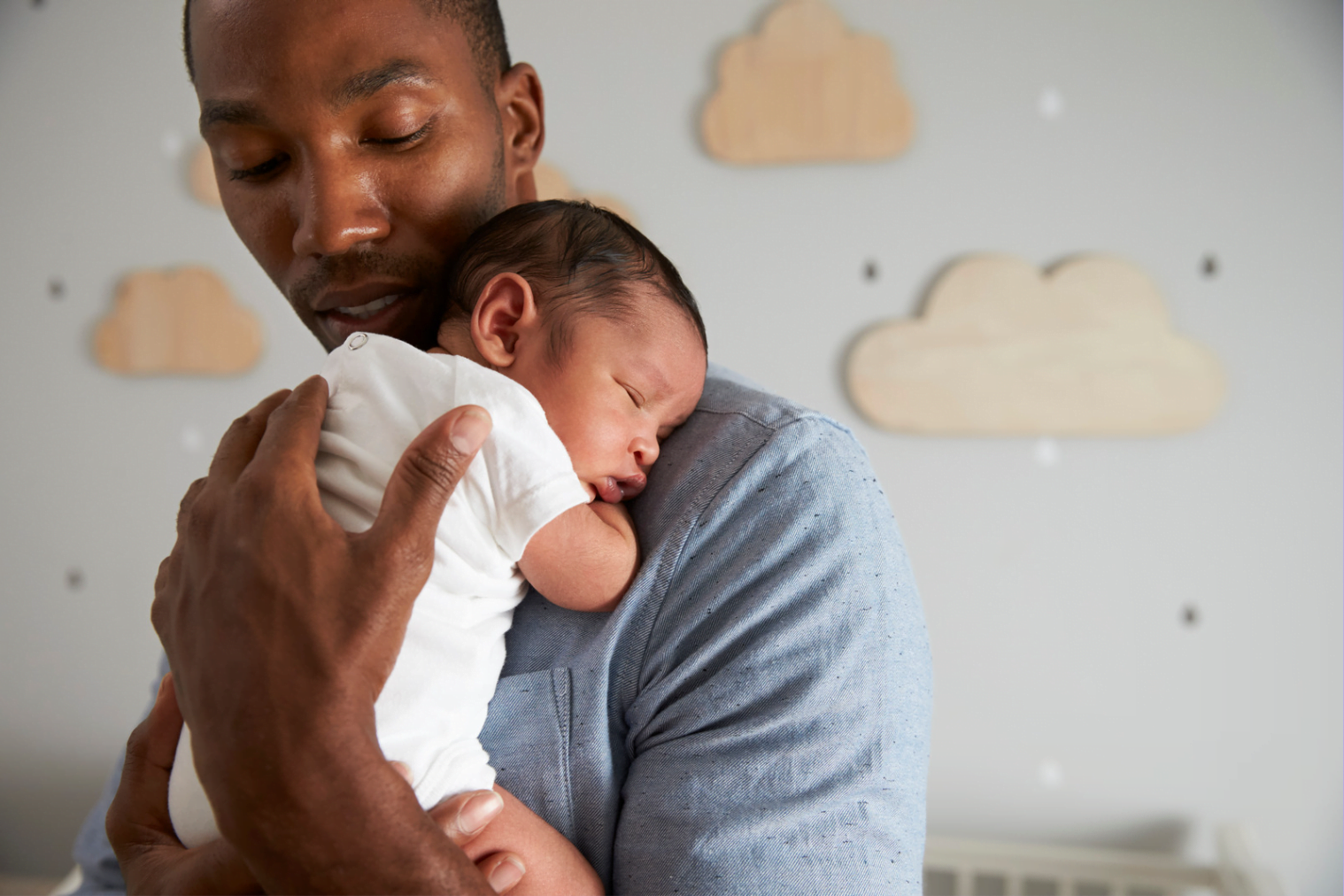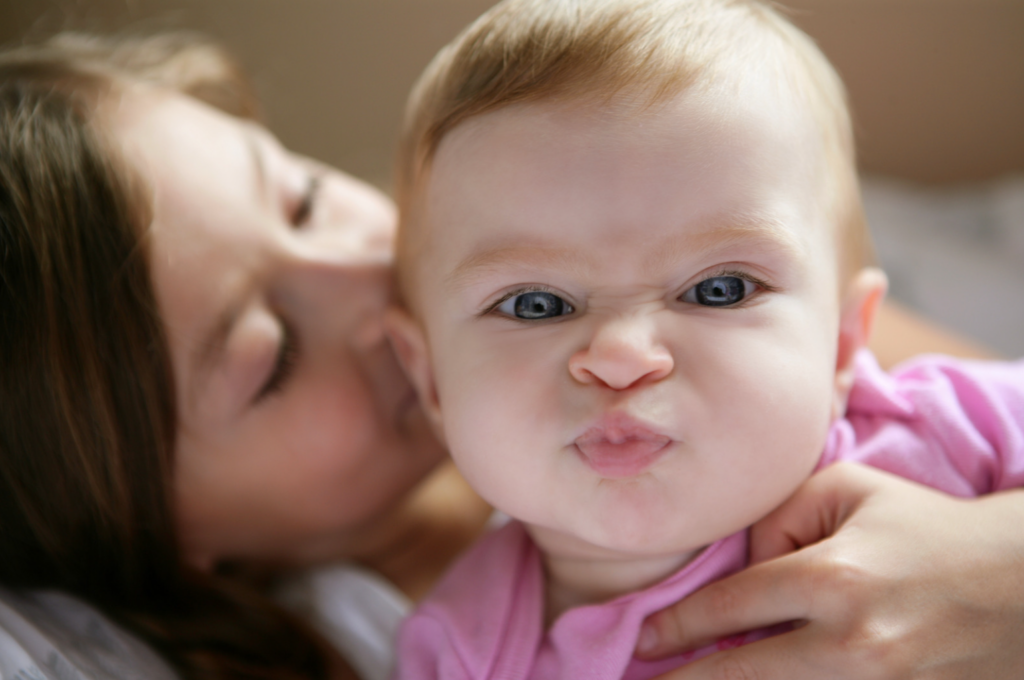Why Is My Newborn Grunting and Squirming While Sleeping?

Sleeping 'like a baby' might sound blissfully serene. In fact, baby sleep is not as peaceful as it sounds! You might be surprised as a new parent by the range of weird and wonderful noises and movements your little darling can make!
Its very normal as a parents to worry as your baby grunts and wriggles through the night. So in this article we'll talk about the different types of movements and sounds that babies can make during sleep.
In this article we get tips from certified 'Chill Mama' Rosey Davidson - sleep consultant and author of Just Chill Baby. We cover which of baby's sleep sounds are perfectly normal, and which may indicate a problem that requires medical attention.
Is it normal for newborns to move and make noises while sleeping?

The shorts answer is yes! It's very normal for newborns to move around and make lots of noises during sleep.
Even as we sleep soundly, we pass through different stages of activity. Deep REM (random eye movement) sleep in particular, is associated with lots of movements and sounds. That's true for young babies, as well as older children and adults.
Newborns spend a lot more time in REM sleep than older children and adults. This means they also move and make more noise during sleep.
Why does my baby grunt and squirm while sleeping?

Babies grunt and squirm for many reasons during sleep, and most of the time it's totally normal.
Healthy sleep movements occur at two stages of a sleep cycle - in early, light sleep and then again during deep REM sleep.
Babies may also make grunting sounds and squirming movements if they are having a bowel movement. This is because they are learning to contract the correct abdominal muscles and relax their pelvic floor, which takes a few weeks to get the hang of!
When do babies stop pooping at night?

Passing stool at night tends to continue until a baby's digestive system matures a little after the first few months (usually between 4 and 6 months.) Typically, as they grow and their digestive system matures, they might gradually shift to fewer nighttime bowel movements.
Introducing solid foods can also impact bowel habits, potentially leading to changes in when they poop during the day versus at night. More solid foods can cause more anal stimulation and make them feel uncomfortable which can lead to night time waking during weaning.
Always keep in mind that individual baby’s development and habits differ, so what’s normal for one might not be the same for another.
Normal sounds during healthy baby sleep
Baby grunting and other typical newborn sleep sounds

Its understandable that parents worry about their baby if they are a noisy sleeper. So here is a run down of the science behind some of the normal baby noises that can happen during sleep.
Young babies can only breath through their noses
Until around 3 to 4 months old, a baby breathes exclusively through their noses. Their tiny nasal passages mean that even a small amount of mucus or milk residue can cause congestion-related sleep noises as air passes more slowly for a period of time.
Babies have a tiny nose and voice box - roughly the width of a drinking straw. Congestion can indicate a cold or other respiratory infection causing blocked nasal passages. But it can also often be happen with normal levels of mucus or milk residues that can easily cause a partial blockage in the nose and throat even when your baby is well.
Young babies pausing or intermittently breathing
A baby's brain and respiratory systems are on a learning curve. As they adapt, brief variations in breathing rhythm might be noticeable during sleep.
It's completely normal for babies to have pauses for up to a second during sleep time. A baby may also have periodic breathing or irregular breathing, with episodes alternating between fast breathing and then slow or quiet sleep where breathing seems very shallow.
A pause in breathing is often followed by a deep single breath, sigh or a period of rapid breathing. Again this is totally normal and shows signs of normal breathing for this stage of a babies brain development.
Grunting noises during sleep
When your baby grunts during sleep, it's usually okay and quite common. These grunting noises are like soft, repetitive moans that babies make, especially when they're moving or changing positions as they sleep.
Most of the time, these grunts are just how babies sleep and nothing to worry about. Sometimes, it's because their body is getting used to sleep changes or they might feel a bit uncomfortable due to digestion or adjusting to sleep.
If the grunting seems like a lot or makes your baby upset, or if there are other strange things happening, talking to a doctor can help give you peace of mind and make sure everything's okay with your little one.
Normal movements during sleep
It can be hard to know whats normal when it comes to baby movements, here are just some of the normal movements your might see.
Startle reflex during light sleep

Sleep cycles typical lasts 90 minutes. In the first 2 stages of light sleep a babies movements can happen if there's a loud noise or bump that surprises them.
Babies have a startle or 'Moro reflex, which causes them to reach out their arms and legs (and fingers and toes!) when they hear or feel something even a little surprising! This can happen even in sleep, and can even wake them.
The Moro reflex is a normal protective reflex that helps them reach out if they feel the are being dropped, but it can disturb baby sleep, especially for newborn babies.
To help with startling during sleep some parents find swaddling their baby helpful. This gives them a feeling of security, similar to being in the womb, by holding their arms and legs close to them.
Movements during deep sleep
During deep REM sleep babies can make a grunting noise, cry, suckle or even open their eyes. You might be tempted to pick them up to try to settle them. However many of these times a baby is actually still sleep and will settle themselves if left.
How do I stop my baby from grunting in his sleep?

For most babies grunting intermittently is totally normal, you don't need to worry or stop your baby grunting during sleep like this.
If your baby seems unsettled you might consider the sleeping environment. You can check the temperature of the room, amount of layers and whether your baby has a dirty or wet nappy.
Common medical reasons for strange noises and disturbed sleep

Rarely breathing noises and movements during sleep can indicate a medical problem that requires medical attention. Here's what to look for.
Respiratory distress

Respiratory distress refers to severe breathing difficulty when unwell.
Signs of a respiratory problem may include the following symptoms: very rapid breathing, flaring nostrils, chest retractions (visible sinking of the chest between or under the ribs), loud grunting while breathing, or a bluish tint to the lips or skin.
Respiratory distress can be caused by various factors, such as infections, lung problems, or heart conditions. If you notice any concerning signs of respiratory distress in your baby, such as persistent difficulty breathing or changes in their skin colour, seek immediate medical attention.
If you think your baby or child is struggling to breath you should seek medical attention - contact your paediatrician or doctor immediately and get advice. Prompt evaluation by a healthcare provider is crucial to determine the cause and appropriate treatment.
Infant dyschezia

Infant dyschezia, also known as grunting baby syndrome, is a condition in which a baby seems to struggle passing stool, despite no other signs of constipation (like hard stool).
Babies experiencing dyschezia seem to struggle with passing stool despite not showing signs of constipation. They might strain, grunt, or fuss for around 10 to 30 minutes before successfully passing stool, which typically appears normal once it comes out.
Acid reflux

Acid reflux in infants occurs when stomach acid flows back up into the esophagus, causing discomfort. It’s common and often called gastro-oesophageal reflux disease (GERD) in more severe cases.
Symptoms may include frequent spitting up, fussiness after feeds, arching of the back during or after feeds, and sometimes, coughing or gagging.
Managing acid reflux in babies often involves simple measures like feeding adjustments, keeping the baby upright after feeds, and ensuring they are comfortably positioned during feeding. Mild reflux is very common in a newborn, but if your baby is not gaining weight, or your worried about symptoms that might indicate other functional gastrointestinal disorders
In severe cases, doctors might recommend specific feeding techniques or medications. Always consult a healthcare provider if you suspect your baby has reflux to discuss the best course of action.
How long does newborn active sleep last?

Newborn active sleep, also known as REM (Rapid Eye Movement) sleep, is a significant part of a baby's sleep cycle.
Typically, newborns spend about 50% of their sleep time in this active sleep stage. This phase is characterised by eye movements, increased brain activity, and heightened muscle movement, which might include twitches, squirms, or even brief vocalisations like crying or moaning.
A newborn's sleep cycle is relatively short, lasting around 45 to 60 minutes. Within this cycle, they transition through different stages, including active sleep and deeper, more restful sleep. As they grow, their sleep cycles will gradually extend, and they'll spend less time in active sleep.
Take Homes
Babies can be noisy and fidgety in their sleep! Their night routines aren't always quiet; they make sounds and move a lot.
It's normal for babies to squirm and grunt while they snooze because their sleep is pretty active, especially the rapid eye movement (REM) part. This happens a lot in newborns—almost half of their sleep is this busy phase.
Sometimes, though, these movements and sounds can signal something to keep an eye on. If your baby's sleep seems extra strange or worrying, it's smart to chat with a doctor just to make sure everything's A-OK.
Understanding how your baby sleeps can help tell what's normal and when to check in with the doc for some peace of mind.
Get more helpful information from our community of families and caregivers. Join the Poppet waitlist today to find out when Poppet is available near you.


